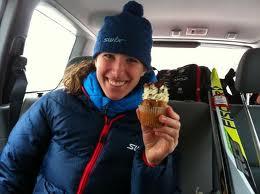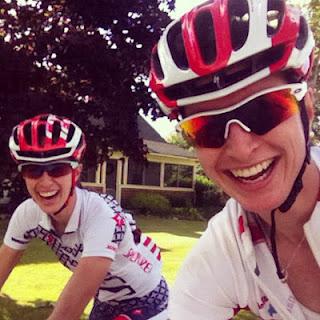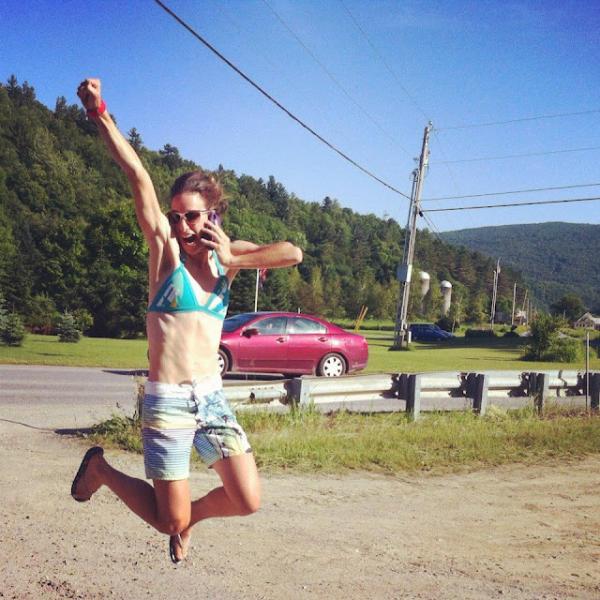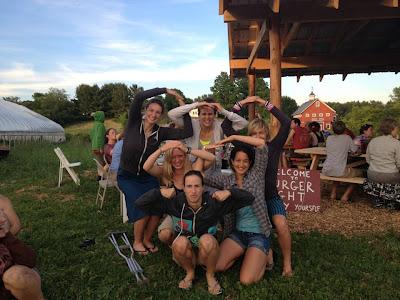Davison's Olympic dreams fueled by maple bacon cupcakes
An evolving identity: Growing into an Olympic athlete




What's the perfect recipe toward becoming a professional athlete? If you were to ask Team Specialized professional mountain bike racer and 2012 US Olympian Lea Davison it would most likely include something with maple syrup.
Actually, this is a topic that many aspiring athletes and seasoned coaches often ponder. However, it depends on a number of factors, and is not a black or white answer. There are many shades of grey and various identities through which athletes transition on their journey towards becoming professional athletes. Another component to this process deals with an athlete's own perception of who they are or to the degree that they identify with their role as an athlete.
Most of the research on athlete identity has focused on the various sport transitions that athletes navigate throughout their athletic careers. Many people dream of becoming a professional athlete or making it to the Olympics, but there are only a few who get to taste this reality. So what does it take? Where does this journey start? According to Davison, it all started as a young girl blazing down the ski slopes of Vermont with the help and guidance of her parents and kid sister.
"My mom and dad were the first to introduce my younger sister Sabra (Sabe) and me to sports," said Davison. "Ironically, my mom grew up in the pre Title IX era and although she is one of the most competitive people I know, she had no opportunity to compete. Because of this, she wanted to give us as many opportunities as possible. She started us out with downhill skiing. I was probably around eight years old and my sister six."
Davison tried various sports such as skiing, swimming, soccer, and cross country running. "It was not until my junior year of high school that a friend introduced me to mountain biking. I took to it immediately and started doing local races, which then evolved into the east coast NORBAS and qualifying for the junior world championships. My sister and I were part of John Kemp's Team Devo, which have created many amazing cyclists, including Ryder Hesjedal. My parents have always been supportive but most importantly they help me maintain perspective and excitement for everything I do on and off the bike."
All of these athletic pursuits would eventually lead Davison to feeling as though sport was part of her identity and that she was meant to compete.
"It is hard to really pinpoint when I started to see myself as an athlete, I think I have always had this identity," said Davison. "During high school, I was in a program for downhill ski racing where I only went to normal high school for one day a week. During this time period I become more aware of training mentally and physically towards athletic goals. My ski coaches and parents were really supportive of this identity and my sister and I trained together so that reinforced this role."
The latest race content, interviews, features, reviews and expert buying guides, direct to your inbox!
"It took us a little while to work out the kinks of a competitive sister bond, but it has played to both of our advantages bringing us to new heights. Sadly, my sister cannot race bikes anymore due to sustaining multiple concussions. Aiding her through the recovery process was an eye opening experience, and I am an advocate for proper awareness and management for concussions in sport."
Although Davison is unable to train and race with her sister, their bond has led to other ventures like starting the girls' mountain bike development program called Little Bellas. She has also found that sharing the experience of being a female athlete with her sister has perhaps been a key factor to overcoming some of the struggles in a male dominated sport.
Davison, like many female athletes deals with a concept called "intersectional identities" where she can hold the identity of being a daughter, sister, athlete, mentor, significant other, etc., which can often enhance or hinder her athletic performance. "I believe that I need intersectional or multiple identities to feel balanced. As of now, first and foremost, I am a professional mountain biker. However, I am also a Little Bellas mentor and founder, role model, sister, daughter, friend, and significant other."
"Being a professional athlete is challenging because it's literally a full time job. Every decision impacts my energy and well-being. Sometimes, I feel like I have to make selfish decisions based on how I feel, how much rest I need, and this is really challenging."
As Davison has grown deeper into her cycling career and identity, she has settled somewhat with making decisions addressing my cycling needs and feeling okay with this. The off-season is the only time when she can let loose. "This is a very hard concept for people outside the athletic realm to understand. I lived in Durango, Colorado for a year after I graduated college, and this was a very interesting time for the development of my athletic identity. I felt like I was only known as Lea Davison, the professional mountain biker. It felt way too linear to me and I craved that intersection. I finally ended up moving back to Vermont, where I knew I would feel whole again. Finding a place where you can feel grounded and balanced is an important part of developing into a professional athlete."
After returning to Vermont, Davison continued to race professionally but struggled to maintain focus and motivation. Many athletes who have identified as an athlete since childhood often experience transition periods of burnout. A twist of fate would have a potential career ending injury become a tool for renewing her drive and passion for racing. "Before my hip injury, I was surprisingly struggling in the off season with motivation. I wasn't as excited to start training as I thought I would be. Then, I was injured and misdiagnosed for about two months. This was an extremely frustrating time for me. I had no plan. You take something completely for granted until it is taken away from you.
"I was finally diagnosed with a hip labral tear that would need to be surgically fixed at some point. There was the decision whether to race the 2010 season or to get the surgery immediately, skip the 2010 season, and start the rehabilitation process. It was hard, but, with the goal of the 2012 Olympics in mind, I wanted to get the surgery and start with a new plan. I worked with Bill Knowles and he was critical in making my comeback from injury successful. He took the view that my injury was a chance to come back stronger, which is exactly what I did."
"This recovery time was a period of time where I could, first, rest my body and mind, which after eight straight year of pursuing my cycling goals, I probably needed. In retrospect, everything happens for a reason and I needed this injury to jump to the next level in cycling."
Missing the 2010 season could have negatively impacted her 2012 Olympic pursuit, but instead it was the first time in years where she was able to rest and look at the big picture. "The season I spent off the bike recovering from my hip surgery was a great time for me to nourish other aspects of myself. It was a well-needed mental break and refreshing. It was also extremely motivating and forced a new perspective and love for the bike."
"I think my entire athletic past adds to the athlete I am today. Everything builds on itself. Mentally, ski racing is what really helps me even today. Ski racing, at a certain level, is 99 percent mental so I have years of mental training under my belt. I believe cycling is close to that percentage, once you are competing at the top level that can make or break a race. I am still learning and honing in my techniques, but it's an area that should not go overlooked."
While some kids are dreaming of Disney Land, an eight-year-old Davison dreamed of the Olympics. But it was not until she found the sport of mountain biking that she finally realized her dream could come true.
Of course, she has many people to thank who have contributed to her professional ambitions. "I have been lucky to have coaching resources and support for most of my career. It's just a series of meeting the right people at the right time. Andy Bishop coaches me, he really pushes me and his guidance is the reason I am where I am today. Everyone is different, but, for me, I need a coach and a set training program. I am starting to work with Allen Lim for nutrition, which has improved my performance as well. My massage therapist, physical therapist, and orthopedic doctor are all instrumental in my success. It really takes a village, doesn't it?"
Besides loving Vermont, spending time with her sister Sabe, and racing for Specialized, Davison also has an affinity for sweets, "Everything is better with maple syrup."
The spring campaign to make the Olympic selection was a tumultuous experience but she maintained the razor sharp focus needed to achieve solid results. She is looking forward to representing the US at the Olympics in London and hopefully inspiring more Bellas into cycling. Davison said that she is fueled for the upcoming Olympics by the love and support of her family, friends, and fans, as well as maple bacon cupcakes.